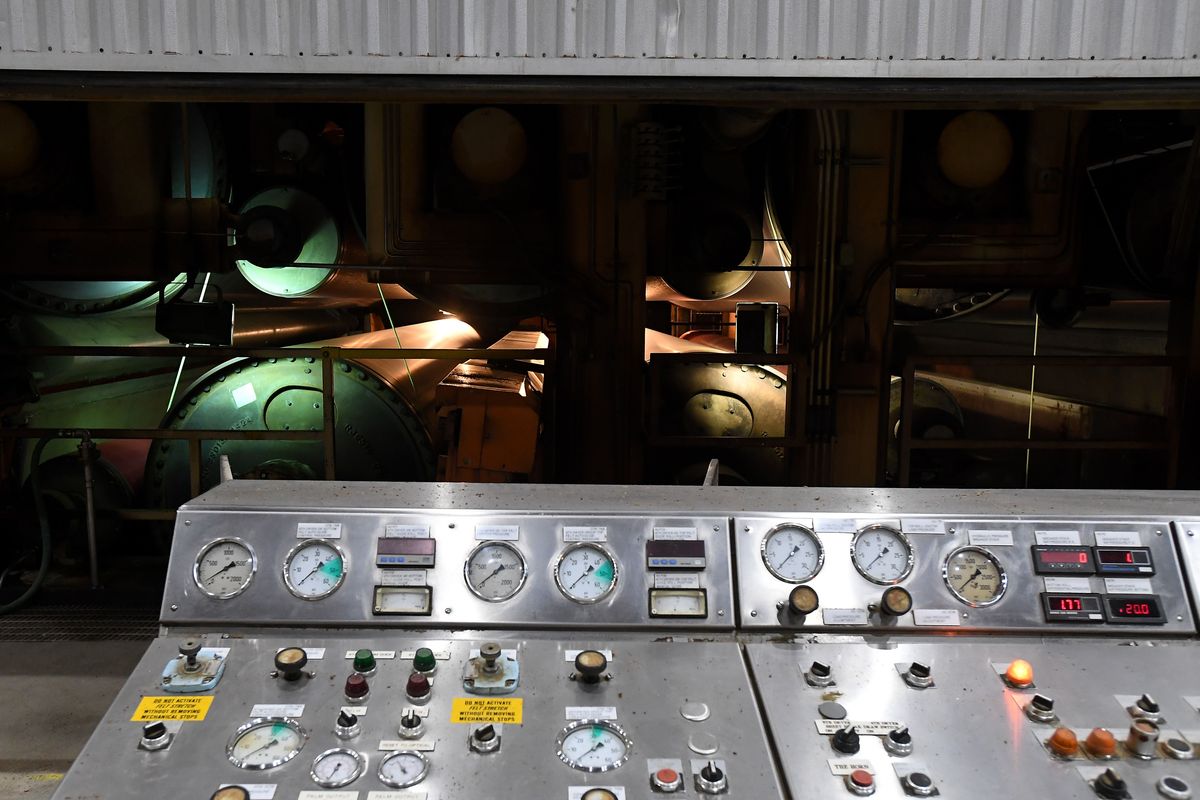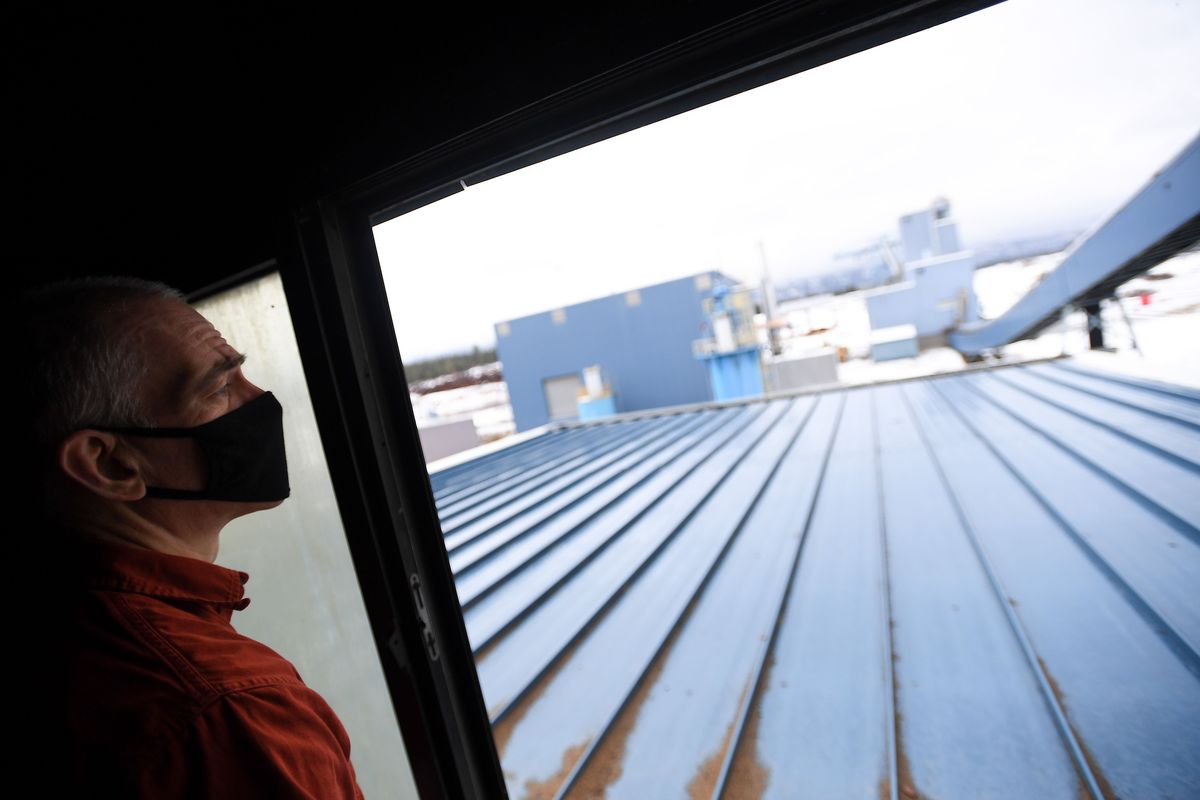Investor teams with Chinese tech company to convert northeast Washington town into crypto capital
Todd Behrend, Interim Mill Manager of the Ponderay Newsprint Mill looks out over the vacant property as he gives a tour of the closed facility on Thursday, December 17, 2020, at the Ponderay Newsprint Mill in Usk. (Tyler Tjomsland/THE SPOKESMAN-REVIEW)Buy a print of this photo
Nearly a year after a bankruptcy trustee told a federal judge that Allrise Capital represented the best chance for about 140 workers to get their jobs back at a paper mill in Usk, the California-based company that owns it hasn’t produced a single roll of newsprint.
Rather than refitting the factory to make cardboard and rehiring the workers as advertised, the venture capitalists instead crave as much cheap electricity as they can get for a different kind of venture.
Allrise Capital Inc., and its CEO, Ruslan Zinurov, have partnered with a major Chinese tech company, Bitmain, to convert the town of about 1,200 people into what they foresee will be the cryptocurrency mining capital of the nation.
“This is an American company called Allrise that has partnered with a Chinese company, the biggest name in bitcoin mining, and they are trying to invest in America,” former plant manager Todd Behrend said. “This is a great story about bringing Chinese jobs to the United States.”
Allrise has secured initial approval for 100 megawatts of power from the Bonneville Power Administration for what was the Ponderay Newsprint site. Allrise last year outbid the Kalispel Tribe at a bankruptcy auction for $18.1 million.
But Allrise, based in Irvine, Calif., has sought preliminary approval from the BPA for up to 600 megawatts, said Behrend, who has been hired by Zinurov as general manager for the newly formed cryptocurrency-mining company, Merkle Standard. Those megawatts sold by the federal agency would come largely from the region’s cheap, reliable and carbon-neutral hydropower facilities.
Last month, Zinurov told the cryptocurrency publication Cointelegraph that the partnership with Bitmain will “catapult our growth plan of building one of North America’s largest sustainable digital asset mining platforms.”
Deane Osterman, executive director of natural resources for the Kalispel Tribe, said its leaders don’t necessarily object to the cryptocurrency mining operation, but they want more information.
“We don’t understand, like most folks, the crypto-mining business,” Osterman said. “Who are these people? How are they going to do business? Everything is so rapidly changing in that space, it’s hard to get up to speed.”
Zinurov did not respond to several requests for comment from The Spokesman-Review.
About 90 shipping containers, the metal boxes used to move freight by ship or truck, already have arrived, with more showing up daily. They are packed with Bitmain-designed electronics used for cryptocurrency mining, Behrend said.
The company eventually plans to bring in 143 of the “modular-data centers” that would operate on the first 100 megawatts. Instead of about 140 workers employed by the mill, Behrend said, the company expects to hire about 40 employees to manage cryptocurrency mining.
“The modular-data centers are built in the dimensions of containers so they are easy to ship,” Behrend said. “It’s got all the components you need. You hook up power and communications to it and you start mining.”
However, except for a few small crypto machines and excavation work to tear up pavement to make room for containers, the major operations have not yet begun.
Everything is waiting for final approval of the power agreement with the local utility district and a conditional use permit from Pend Oreille County to run the operation in a residential zone.
Despite operating for about 30 years as a paper mill on the 972-acre property that includes 29 buildings, the land is still technically zoned residential R-5, which allows only one residence per five acres.
Hearing delayed
Pend Oreille County Commissioner John Gentle said that process has been slowed because the hearing examiner, who had been driving up one day a week from Spokane, has retired.
Gentle said the fact that the plant has remained zoned residential for the past three decades is a small indication of some of the land-use challenges his board faces.
As an elected leader, Gentle – who commuted to Spokane for two decades to run a landscaping business – said Pend Oreille County is not short on ideas, it’s just short on the money needed to fund them.
“As much as I’d love the jobs back, I don’t know that it does the county any good” to force a company “to limp along into something that doesn’t pencil out,” he said.
He explained that county leaders had heard warnings that the business model for Ponderay Newsprint was failing before it finally shuttered in June 2020.
The mill produced huge rolls of paper, called newsprint, that were used by Quebec-based Resolute Forest Products and five major U.S. newspaper publishers.
“That plant has kind of propped up this county for three decades,” Gentle said. “It was just a few years ago we were staring at the end of life for newsprint. We were in denial.
“So now, we are seeing the transition inside of a year from the loss of newsprint to a completely different industry. We just advanced the county 150 years.”
Osterman, of the tribe, said he knows the loss of revenue from the plant closure left county budgets “struggling.”
“We’ve been trying to increase forestry and other things to bolster the economy so the county can function,” he said. “It’s not a surprise that they dance with the first entity that shows up.”
Still, the tribe may totally embrace Merkle Standard and its business partners, Osterman said.
“What we have been trying to do for years is some thoughtful planning,” he said. “What can the community tolerate? How can the county and tribe work together for a good, sustainable economy … and balance all the other values that we love about the place?”
However, the tribe wants information about heat releases, power use, noise and others issues that have not yet been explained.
“We want to be able to understand what are the issues that surround crypto mining and just explain those in the permit so we can develop a position to support or not support,” Osterman said. “But right now there are more questions than there are answers.”
While Gentle says he understands the blockchain process, he said he has a lot to learn about mining for bitcoin.
But he didn’t mention until asked in an interview that his wife, Kimberly Gentle, was hired four months ago by one of the biggest cryptocurrency mining companies in the world.
Kimberly Gentle is now vice president of energy development and site development for Northern Data AG, a company based in Frankfurt, Germany, that last year sold one of the largest cryptocurrency mining operations in America, which was based in Texas, for about $651 million.
While Northern Data does not have a contract with Allrise or Merkle Standard, it recently set up shop in Newport and is currently advertising for more employees, including those who speak Mandarin Chinese.
Behrend, the Merkle Standard general manager, said Allrise considered contracting with Northern Data as a service provider before instead signing with a similar company, Napier, which has offices in the U.S, Australia, Singapore, Malaysia and the United Arab Emirates.
Merkle Standard recently hired Monte Stahl to serve as its chief operating officer. At the time of his hiring, Stahl was working in Newport as managing director for Northern Data, Behrend said.
In late November, when Allrise submitted its conditional use permit to operate the former newsprint mill as a cryptocurrency mining operation, Kimberly Gentle was in Stanton, Nebraska, lobbying for a $20 million “cloud-based computing” center on 40 acres near a Nebraska Public Power District substation.
Kimberly Gentle declined to comment last week when asked about her work for Northern Data.
John Gentle, the county commissioner, said it shouldn’t matter that his wife works for a major cryptocurrency mining company. He noted that the hearing examiner, not the county commissioners, will make the final decision on Allrise’s permit request.
“It’s a different data-mining company,” Gentle said of Northern Data. “There is nothing suspicious. There is nothing unethical. There is nothing law-breaking. We are good people doing good things. That’s the long and short of it.”
Power struggle
The requests for power needed to convert Usk into a cryptocurrency destination keep changing.
Allrise officials initially sought approval for about 300 megawatts from the local utility, Pend Oreille County Public Utility District No. 1.
Since the PUD had provided an annual average of about 85 megawatts to the former plant, it needed approval from the Bonneville Power Administration for any extra power, said Colin Willenbrock, the PUD’s general manager.
Behrend said the company expected that the BPA would only approve the power it once used for the paper mill, and for only that use.
“We were shocked when the BPA came back and said we could get 100 megawatts but we could not run the paper manufacturing business without modifications to the grid,” he said.
Willenbrock, however, disputed that account.
He said the company initially requested the 300 megawatts in a “blended load.”
He explained that power loads are different for a mill, which has big machines turning on and off, versus cryptocurrency mining, which uses a steady stream of power to constantly run the banks of computers.
Willenbrock said before the BPA could issue its decision on the 300 megawatts, which could have powered both the plant and cryptocurrency mining, Allrise “pivoted and said, ‘Just tell us how much can we do if it’s just crypto.’ ”
The answer from BPA was 100 megawatts, he said.
“The customer was in a hurry. It was very convenient for the customer to now say that the reason we are not saying to restart the mill is because the BPA said we couldn’t,” Willenbrock said. “That’s not true.”
The PUD has continued to review the contract to make sure that all of its other residential and business customers are not harmed by entering into a massive power arrangement with one entity, he said.
“As a public utility, our fundamental obligation is to provide nondiscriminatory utility services,” Willenbrock said. “No one particular rate class will be harmed by another rate class. That’s what we are working on is to make sure we have a good, fair contract that protects the utility and other ratepayers.”
Steve Wright, 64, recently retired as general manager of Chelan County PUD. Before that, he served 12 years as CEO for the BPA.
Wright said the power contemplated by Allrise, up to 600 megawatts, “is a massive amount of electricity.”
The 600 megawatts could power two former Kaiser Aluminum Mead smelters operating at full capacity, he said.
“It would be the largest industrial loads in the Northwest,’” he said, “and the largest industrial loads since the aluminum industry left the Northwest.”
Willenbrock noted that the Pend Oreille PUD would have to pay for upgrades to meet Allrise’s 600-megawatt request.
“There’s a lot of questions whether the regional grid could even accommodate flows up to that level without substantial facilities upgrades,” he said.
Wright said contracts with huge manufacturers like Kaiser Aluminum would be different than those with emerging technologies.
Aluminum plants “are going to be there for a long time,” he said. “You can make an investment in infrastructure and transmission lines and have a high probability that the customer will be there a long time to pay you back.
“With cryptocurrency, you don’t know that,” he said. “That causes you to rethink your relationships and contracts.”
What is Allrise Capital?
Behrend said Zinurov, the Allrise Capital CEO, was born in Russia before becoming a U.S. citizen.
According to his profile on LinkedIn, Zinurov graduated with an MBA in finance from the University of California, Berkeley, after obtaining his bachelor’s degree in business administration from the University of Wisconsin-Green Bay.
Behrend said Zinurov is married to a Ukrainian woman. Before becoming CEO of Allrise, he worked with Barclay’s Investment Banking in the Silicon Valley, according to his online biography.
Allrise was founded in 2016 by Vladimir Evseev as Allrise Financial Group Inc.
Zinurov signed an “Amended Statement by a Foreign Corporation” in California in 2019 to change its name to Allrise Capital Inc.
According to its website, Allrise “prefers to invest in real estate, venture capital, and special situation opportunities in the United States and Eastern European markets.”
According to published accounts, Zinurov in 2020 purchased the soccer stadium and home of the Chernomorets soccer team in Odessa, Ukraine. He reportedly paid between $5 million and $7.29 million for a facility that previously had been valued for about $40 million.
“Ukraine represents a unique investment opportunity as the country continues to undergo a fundamental democratic and economic transformation, integrating deeper into the global economy,” Zinurov said, according to published reports in Ukraine before the Russian invasion.
Zinurov purchased the stadium and surrounding structures in what had been the 17th effort to sell it, according to published reports.
The stadium previously had been used as collateral by Leonid Klimov, an ex-member of the Ukrainian parliament and wealthy Odessa businessman, who withdrew vast sums of money from the now-bankrupt Imexbank, which Klimov controlled at the time.
After the purchase in 2020, Zinurov pledged to invest another $10 million to upgrade the soccer stadium.
“Our goal is to make the stadium a world-class sports facility for football fans and residents of the Odessa region,” Zinurov said in a published news release. “Allrise Capital has plans to invest in the development of technical infrastructure of the arena and make the stadium accessible not only for sports but for other socially significant events in the region as well.”
Behrend, the former plant manger, said the stadium and paper mill are examples of properties that Allrise targets.
Allrise “finds distressed assets that they feel like they can stabilize and return them to profitability,” he said. “They either retain or sell them. They do some of each.”
Allrise and Zinurov are also listed among the board of directors for the U.S.-Ukraine Business Council, which has promoted U.S. and Ukraine business relations since 1995.
Gentle, the county commissioner, said he is not concerned about doing business with a California businessman who signed an agreement with a Chinese-based technology company to take over the former Ponderay Newsprint.
“Nobody knows a lot about bitcoin or digital currencies in general,” Gentle said. “The communication, for my part, has been solid. I feel like they have tried to be transparent.
“Until they give me a reason not to trust them,” he continued, “It’s out of my headlights.”


